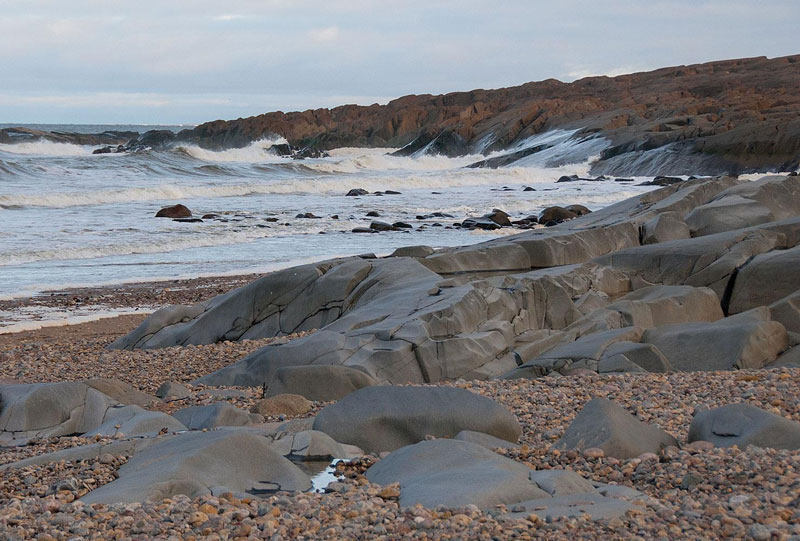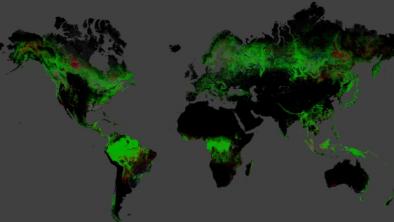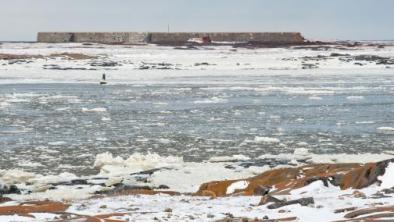Canadian Arctic port and rail company pins hope for revival on oil exports
The Guardian (UK)

Bakken shale shipments across 810-mile railway that shifts over unstable permafrost raise concerns over safety and wildlife
Operators of Canada's only deepwater Arctic sea port say they will "anchor" its future in the transport of crude oil across remote northern wilderness and polar bear habitat.
The prospect of transporting crude oil for hundreds of miles on a rail line that buckles and bends with the unstable permafrost beneath, and then out to sea in the Arctic, has generated controversy in Canada.
The country is still recovering from a horrific accident last July involving a runaway oil train.
The explosion in Lac Megantic, Québec, killed 47 people and turned the town into a fireball.
Now Omnitrax Canada, which owns the rail line to Churchill as well the port facilities at Hudson bay, said for the first time it sees crude oil freight as the future of Arctic shipping.
"Think of it as a shopping mall. Grain is one of our anchor tenants and we hope that oil will be another," Merv Tweed, president of Omnitrax Canada, said.
The company said it planned to send a first test crude oil shipment through the port to Rotterdam in mid-2014: loading six separate 80-car trains with 330,000 barrels of light sweet crude, and then transporting it across 810 miles of remote terrain to the coast.
The plan has met resistance from provincial authorities in Manitoba. The conservation department warned of a "catastrophe" for polar bears in the event of a spill in the northern wilderness or the waters of Hudson bay.
The proposed route for crude oil shipments crosses large seasonal populations of polar bears, beluga whales, and other wildlife.
"It's going to be one of the biggest catastrophes in the world if we ever do have a spill… and there is no doubt in my mind, we are going to have a spill," Daryll Hedman, the regional wildlife manager of Manitoba Conservation, told a public meeting in October.
Hedman said a spill would create a "perfect storm" for polar bears, fouling their environment just as the animals are coming off the ice and into the denning season.
Omnitrax said oil freighted by rail was critical to the survival of Churchill port in a changing Arctic.
The Hudson bay port offers a more direct route to Europe for shipments from the mid-west. Like much of the Arctic, ice seasons in Hudson bay have shortened in recent years.
More than 60 ships travelled through the northern sea route so far this year, compared with just four making the crossing in 2010.
Tweed said a fall-off in wheat shipments had led the company to begin seeking new business in the shipment of crude oil.
"We know that we need to have more options than grain. That is something we have known for a long time now, with the emerging markets for oil and our ability to ship it," he said.
Omnitrax Canada, a subsidiary of a family-owned firm based in Denver, bought the track from the Canadian government-owned firm for $11m (Canadian) in 1997. It then paid a token $10 for the deep water port.
The company said it hoped to move about 3m barrels a year through the Arctic sea port, as the oil industry looks for new routes to market.
An oil glut has forced down crude oil prices in the mid-west. Delays in the Keystone XL and other pipeline projects have pushed industry towards shipping oil out by rail.
In 2009, Canadian producers shipped just 500 cars of oil by rail, according to the Railway Association. By the end of this year, oil shipments by rail were expected to hit 140,000 rail cars.
The closest crude oil to Churchill comes from the Bakken shale, which covers North Dakota and parts of Manitoba and Saskatchewan. North Dakota is now the second biggest oil-producing state in the US, after Texas, and ships 70% of its oil by rail.
Tweed insisted repeatedly the company would not initially transport the heavier crudes produced by Alberta's tar sands, or oil from the US. He said Omnitrax was looking to carry only light crude oil from the Canadian portions of the Bakken formation.
But the Lac Megantic derailment, and a handful of other recent accidents involving oil trains, has brought new exposure to the risks of such shipments.
Campaigners say there are greater hazards associated with transporting oil by rail to Churchill than almost anywhere else.
The 810-mile line from The Pas to Churchill crosses a vast expanse of frozen peat moss topped with more than a foot of permafrost. On much of that journey, trains travel well below an average speed of 30mph, with the cars bouncing and swaying over the shifting terrain.
Journeys can be delayed for hours, as tracks expand and buckle. "It sways and shakes, and derails. It goes slowly, and it goes across permafrost, which means it is going to change every six months," said Eric Reder, campaign director at the Wilderness Committee. "There is nothing any company, or any technology, can do to fix this.
"Any product at all would be better than shipping crude oil."
The line has a long history of accidents, with 66 reported accidents and other incidents between 2003 and 2012, according to the Transportation Safety Board of Canada. Most of those involved derailments. There was at least one minor derailment so far this November at the community of Wabowden.
There have also been reports of failures in the pipeline system at the port, which would transfer the oil from rail cars onto the waiting tankers. A test shipment, initially planned for this autumn, was cancelled.
The company said it plans to spend the winter allaying community's safety fears and that it is spending around $2m on upgrades at the port. "We understand the challenges of pushing oil through the rail line through the north, and doing it safely," he said.
Ultimately, however, Tweed indicated the company would go ahead.
"Obviously, with oil right now we know there is a huge supply in the market, and getting it to market is the biggest challenge," Tweed said. "We can help with that."
Photo: Hudson Bay, near the Port of Churchill (Eric Reder)

